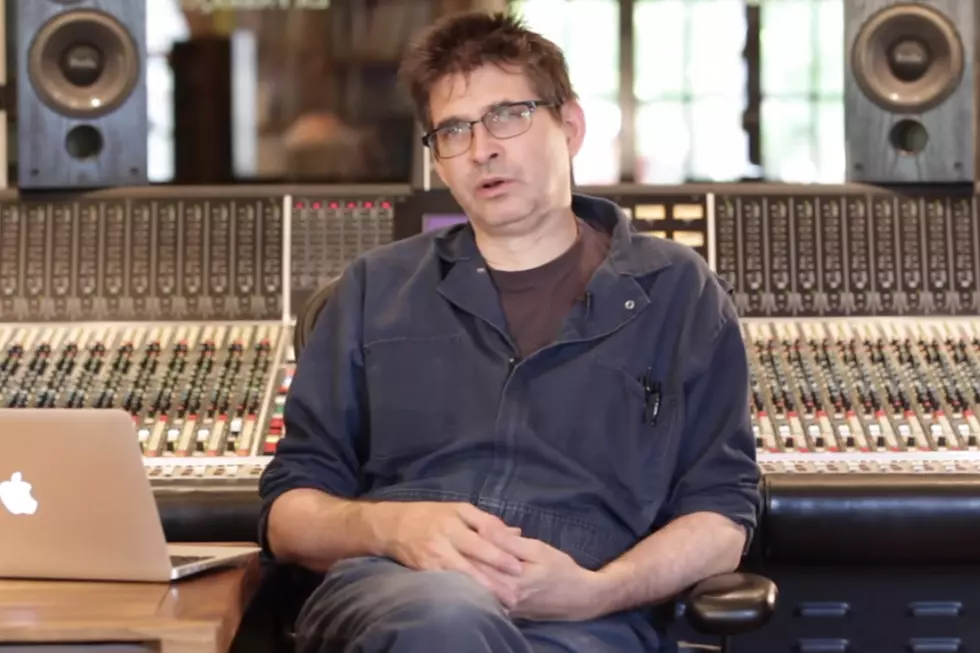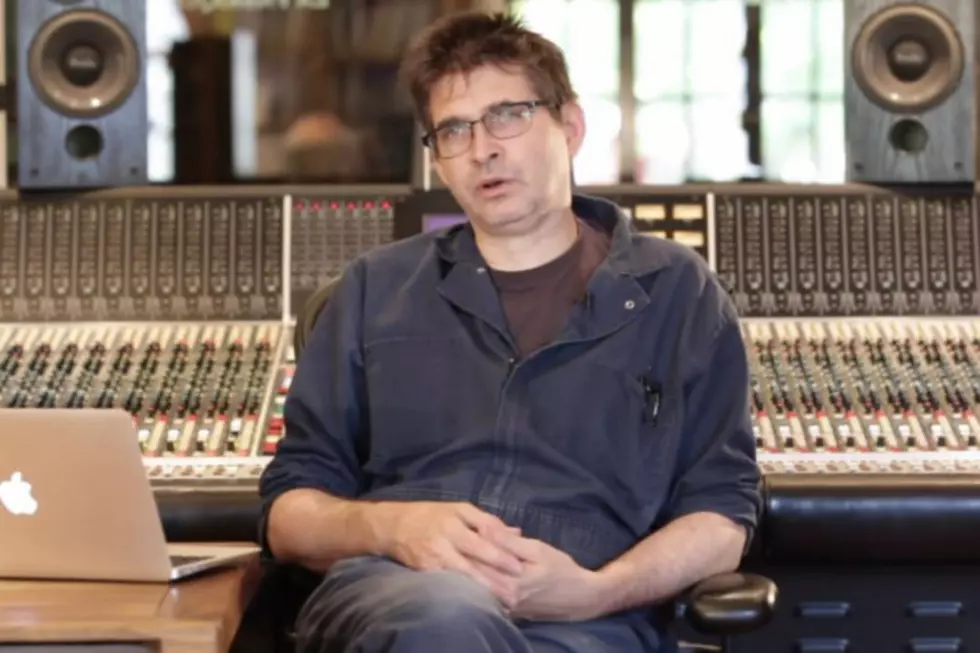
No Copyrights? Them’s Fightin’ Words
Steve Albini isn't making any friends this week. After suggesting that those who defend copyright law "are like people on horseback trying to fight against the automobile," studio musician and sideman Marc Ribot fired back on the indie giant. "Are you willing to sign a Creative Commons license placing your entire catalogue in the public domain?" the guitarist asked in an open letter.
I reacted when I read about this spat ("Yeah, you tell him Marc!"); after all, I'm protected by copyright law, too. I may not have "Smells Like Teen Spirit" dollars on the line, but I have some skin in the game. On the other hand, maybe Albini had a point: Is copyright an outmoded concept? Let's take a look.
See that cool photo at the top of this article? That belongs to somebody. Although you don't have to pay to view it, Diffuser has to pay to use it. See these words you're reading? They belong to somebody, too.
Copyright is a nearly 400-year-old concept that protects the people who make things from having their creations ripped off.
Copyright is a nearly 400-year-old concept that protects the people who make things from having their creations ripped off. Granted, back then the big concern wasn't people ripping off lute solos (Sting hadn't been invented yet) but rather books, which I understand were a primitive form of entertainment enjoyed by an extinct species known as "readers."
Over those four centuries, every time a new technology came along a new debate regarding copyright popped up. When it comes to songs, prior to the late 19th century copyright law concerned itself with sheet music. Not only did this make sense because sheet music was printed and sold much like books, but it also accounted for every known means to reproduce a song.
Not too long after the Civil War, along came technologies like player pianos that could reproduce a song without sheet music. These were followed by early recording technologies. Sheet music sales plummeted as companies used composers' songs on the new technologies and consumers gobbled them up. Folks were getting rich -- just not the folks who created the music, who were stuck with a law that covered only printed music.
A new kind of copyright protection came along known as a "mechanical license." Let's let the trusty Wikipedia summarize what this is:
A mechanical license (or simply, “mechanical”) is a license granted by the holder of the underlying musical work for another party to cover, reproduce, or sample specific parts of the original composition. A mechanical license does NOT give a third party the rights to sample from any phonorecord of the original recording.
That closed the recording/playback gap, but it created a brand new scenario. Now one piece of music essentially had two copyrights. The first still belonged to the composer for the "underlying work" (unless he or she sold it), and the next belonged to whomever owned the recording (the "mechanical"). This triggered the rise of what we now call "the music industry."
When we talk about the music industry, we're really talking about "the mechanical license industry." No analysts mean that banjo string sales are down when they wail that music industry sales are at an all-time low. They are talking about the items that make money via mechanical copyrights, which is to say recordings of songs.
Of course, the composers of the underlying work are hurt, too, when record sales drop. Sheet music sales haven't amounted to much in nearly 100 years. The people who write the music are pretty much dependent on the people who record and distribute the music in order to make a buck, at least in traditional music industry terms.
The mechanical license industry turned out to be big business -- huge business. As early as the 1930s, labels were putting out million sellers. We tend to think of the music industry as a rock era business, but Bing Crosby's 1942 recording of "White Christmas" has sold over 50 million copies and his 1935 "Silent Night" sold 30 million, for example.
By the '60s, breaking into the music business became nearly impossible for young bands. Even future icons like the Beatles, the Doors and Jimi Hendrix were repeatedly turned down away before finally being welcomed inside.
Big business has a way of turning into big industry, and that's precisely what happened with the major labels in the wake of Bing and the rest of the crooners. By the '60s, breaking into the music business became nearly impossible for young bands. Even future icons like the Beatles, the Doors and Jimi Hendrix were repeatedly turned down away before finally being welcomed inside.
By the '70s, an "us and them" mentality had taken root. If the music industry equated to the mechanical license business, and "they" refused to record "us," what was a young band to do? From this incubator sprung the DIY ethos of punk: First indie baby? The Buzzcocks' Spiral Scratch.
The music industry didn't pay much attention to the indie underground (aside from treating it like a farm league), but in the early '80s they grew very itchy about the latest hot technology: home taping. With the popularity of the Walkman and the relatively inexpensive cost of a decent home tape deck, the major labels grew convinced that they were being cheating out of millions of dollars of "mechanical" revenue due to kids taping copies of albums. They lobbied for a tax on blank cassettes with the logic that the only reason anyone purchased a blank tape was to cheat the labels out of money.
The punks responded with pro-taping songs like Bow Wow Wow's "C30, C60, C90 Go." This 1980 track was the first cassette single, released with a blank B-side for your home taping pleasure. The band's label refused to promote it.
Us or Them. If you came up during the '80s this was a real thing, an important thing. Guys like Steve Albini took it to heart. Even with all of his mainstream success as a recording engineer (Nirvana, Pixies, Foo Fighters), Albini still sees the music industry as "a parasite on the music scene," as Billboard reported back in May 2015:
"I don't feel like I am part of the music industry," Albini told an admiring crowd that broke into applause several times. "The music industry meaning the corporatized business structure where there are people on the lower level and people on the upper level, and people in administration making legal relationships between all these people. I've never felt like I was part of that. All of that has always really bothered me. And when I think about it, it makes me angry that it exists as a parasite on the music scene, which is the fans, and bands the people who go to shows. This administrative business structure that's siphoning money out of that whole scene, that has always to me seemed artificial and unnecessary."
In Albini's formulation the music scene, "which is the fans, and bands the people who go to shows" [sic], is distinct from the music industry which, again, since the early 20th century has been in the business of protecting and marketing (or exploiting, if you prefer) mechanical licenses.
But we're in the 21st century now, and mechanicals are in chaos as technology continues to evolve: streaming, file sharing and social media have all but finished what the punk rock DIY movement started. Given context, Albini's comments on copyright make some sense:
I think were seeing that the intellectual construct of copyright and intellectual property ownership is not realistic. Ideas once expressed become part of the common mentality. And music once expressed becomes part of the common environment. I think that the idea of intellectual property will naturally have to be modified to accommodate the way that people naturally exchange ideas and music and information. That old copyright model of the person who wrote something down owns it and anyone else who wants to use it or see it has to pay him, I think that model has expired.
"Some sense" are the operative words here. Albini is right that mechanical copyright laws need to change again "to accommodate the way that people naturally exchange ideas and music and information," just as they did with the arrival of the player piano. Where he's off base, though, is with the assertion that the "old copyright model of the person who wrote something down owns it and anyone else who wants to use it or see it has to pay him...I think that model has expired."
Copyrights that protect the underlying work are the only thing standing between the delicious sheep who make things and the corporate wolves who would eat them. Without that layer of protection, nothing prevents me from claiming that I wrote "Smells Like Teen Spirit," for example. Without copyright protections this essay could become a billion dollar movie starring George Clooney without my permission (hey, it couldn't be worse than Tomorrowland).
Current copyright law accommodates Albini's assertion that "Ideas once expressed become part of the common mentality," it just does so in a manner that allows the creator a little time to reap benefits from his labor. Eventually all creative work ends up in the public domain -- songs, books, Donald Trump's haircut -- where it becomes part of the "common mentality."
Suggesting that the idea of copyright has "expired" devalues creative work to zero.
By all means, let's align copyright law to the realities of the internet age, but suggesting that the idea of copyright has "expired" devalues creative work to zero. Is that really what Steve Albini wants? Is that what any of us wants?
More From Diffuser.fm









